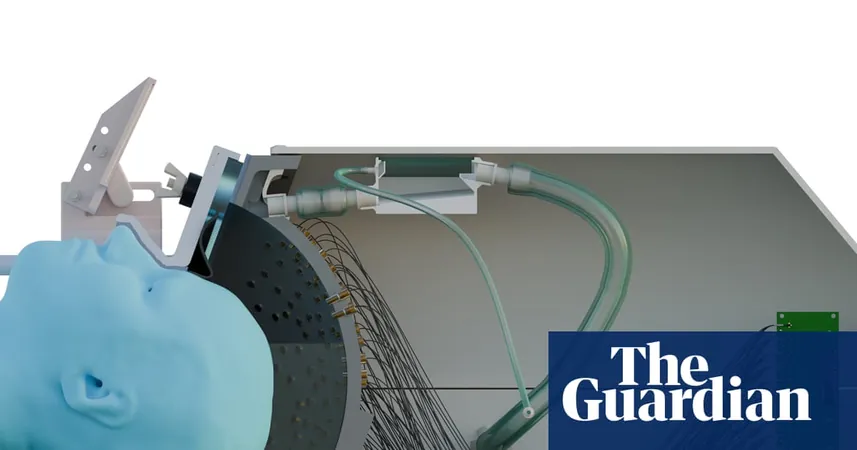
Boost Your Muscle Power: The Secret Weapon Found in Vitamins C and E!
2025-09-02
Author: Yu
Unlocking the Power of Vitamins C and E to Fight Muscle Loss in Older Women
A groundbreaking study published in the journal *Medicine* reveals that vitamins C and E may hold the key to combating muscle loss in older women. Researchers from Liaoning University of Traditional Chinese Medicine and other Chinese institutions have discovered that these powerful antioxidants could alleviate oxidative stress and inflammation, both significant contributors to muscle degeneration.
They noted, "Emerging evidence suggests that targeted nutritional supplementation may mitigate oxidative stress by augmenting antioxidant defense mechanisms." Specifically, vitamins C and E stand out for their ability to scavenge free radicals and inhibit lipid peroxidation, which may contribute to muscle preservation.
Understanding Sarcopenia: The Hidden Threat to Aging Adults
Sarcopenia, a condition characterized by the gradual loss of muscle mass and strength, primarily affects those over 60, with about 10% of older adults facing this challenge. This condition can severely impact quality of life, increasing the risk of falls and fractures, which can lead to a loss of independence.
While physical activities like resistance training are critical for prevention and management, nutritional interventions—particularly increased protein intake—are also vital in the fight against this age-related issue.
The Role of Oxidative Stress in Muscle Degeneration
Oxidative stress plays a central role in the development of sarcopenia. As we age, our muscles’ antioxidant enzyme levels decline, and diets often lack essential micronutrients, leading to heightened inflammation. Interestingly, while resistance training promotes muscle health, it can also produce reactive oxygen species, potentially worsening oxidative stress if not managed carefully.
Vitamins C and E, as antioxidants, may counteract some of these detrimental effects. However, researchers caution that supplementation can sometimes hinder muscle adaptations based on an individual's oxidative state. They emphasize the importance of precise nutrition strategies to optimize exercise benefits.
The Study: How Vitamins Transform Muscle Health
In this study, sixty women aged 60 to 75 with sarcopenia were randomly assigned to receive either 1,000 mg of vitamin C and 335 mg of vitamin E or a placebo, all within a 12-week period. Participants also engaged in three weekly 50-minute sessions of resistance training using elastic bands.
While both groups demonstrated improvements in muscle mass, strength, and physical performance, those taking the antioxidants saw significantly greater gains in arm lean mass, skeletal muscle mass index, handgrip strength, and knee extension strength. However, no notable differences in overall physical performance were observed between the two groups.
The Results: Vitamins That Make a Difference!
At the end of the study, serum levels of vitamins C and E were adequate in the supplement group, highlighting the immediate benefits of the vitamins. Blood markers indicated enhanced physiological adaptations to resistance training in this group, with increased levels of reduced glutathione (GSH) and a favorable GSH/GSSG ratio, pointing to the vitamins’ synergistic effects on muscle health.
Notably, lower levels of IL-6 were detected, suggesting that these vitamins might enhance the body's redox state or exert anti-inflammatory effects, both crucial in preserving muscle mass and strength.
Looking Ahead: Future Research Directions
The findings of this study strongly support the potential of vitamins C and E in the fight against sarcopenia. The researchers recommend further investigations to see if longer-term supplementation could yield even greater improvements in physical performance. This could change the way we approach aging and muscle health, offering hope to millions at risk of losing their strength!



 Brasil (PT)
Brasil (PT)
 Canada (EN)
Canada (EN)
 Chile (ES)
Chile (ES)
 Česko (CS)
Česko (CS)
 대한민국 (KO)
대한민국 (KO)
 España (ES)
España (ES)
 France (FR)
France (FR)
 Hong Kong (EN)
Hong Kong (EN)
 Italia (IT)
Italia (IT)
 日本 (JA)
日本 (JA)
 Magyarország (HU)
Magyarország (HU)
 Norge (NO)
Norge (NO)
 Polska (PL)
Polska (PL)
 Schweiz (DE)
Schweiz (DE)
 Singapore (EN)
Singapore (EN)
 Sverige (SV)
Sverige (SV)
 Suomi (FI)
Suomi (FI)
 Türkiye (TR)
Türkiye (TR)
 الإمارات العربية المتحدة (AR)
الإمارات العربية المتحدة (AR)